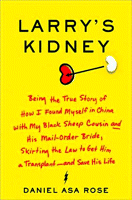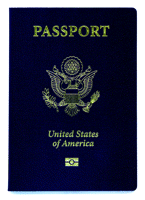The Road to China
Larry’s Kidney: Being the True Story of How I Found Myself in China With my Black Sheep Cousin and His Mail-Order Bride, Skirting the Law to Get Him a Transplant and Save His Life Daniel Asa Rose. New York, New York: HarperCollins; 2009. 305 pages. $25.99. ISBN: 978-0-06-170870-1
Although this is real life and not a road picture, it often reads like one because Rose prefers to play up the screwball comedy aspects of the situation over the pathos.
It’s a classic Hollywood plot: take two men who wouldn’t ordinarily be together and send them off on a quest, preferably to an exotic location. In Larry’s Kidney the two men are the author Daniel Asa Rose and his cousin Larry Feldman, whom he hasn’t seen in two decades. Their quest is to get a kidney transplant for Larry in China. Although this is real life and not a road picture, it often reads like one because Rose prefers to play up the screwball comedy aspects of the situation over the pathos. The book is well written, but very informal. People’s speech is written as it sounds so that when a Chinese woman says “symbolize” it’s written “thimbleize.” Rose explains in the Author’s Note that this was done in the interests of authenticity, and it certainly does convey the experience of being on foreign turf. Larry’s dialect is also rendered phonetically and it’s a doozy. In Larry’s parlance he’s dying of “kiddie disease.” Larry’s other eccentricities, such as subsisting on Girl Scout cookies during his stay in China, are also on full display. The book is an open window into Rose’s thoughts throughout, including his prayers to “Cool God.” Therefore, in the spirit of the book’s informality, Rose and his cousin will henceforth be referred to as Dan and Larry.
However, simply acquiring a kidney is not simple at all: it’s not exactly legal.
The kidney quest begins when Dan receives a surprise phone call from Larry after two decades of estrangement. Larry’s lost both kidneys to diabetes and doesn’t want to spend seven to ten years waiting on the transplant list in the US. He wants a kidney now and he figures the only way to get one fast is to head east. He taps Dan as his travel companion, as Dan’s career as a writer gives him a certain flexibility, and because the rest of their family is mostly “disapproving docs” who refuse to go “shopping for body parts.” Furthermore, Dan has been to China before in 1984 as a journalist. Unknown to Dan, Larry also has an ulterior motive for going to China to meet Mary, the mail-order bride of the subtitle, a Chinese woman he’s been pursuing a relationship with via candey-blossoms.com. The cousins fly separately to Beijing with no firmer plan than to look for a kidney, and if one fails to materialize in a week, move on to the Philippines. However, simply acquiring a kidney is not simple at all: it’s not exactly legal. What they need is the right guanxi or connections. Just before he’s ready to call it quits in China, Dan makes the critical contact through exercising a most fundamental connection: he attends an expat Jewish service and adds Larry’s name to the prayer for healing.
After spending a week in Beijing seeking the right guanxi the cousins relocate to the hospital in the city of Shi. Shi is cursed with a horrible smell, pestilential pollution, and crazy traffic patterns. This is definitely medical tourism as opposed to pleasure tourism. If it weren’t for the promise of a kidney, they would be gone in an instant. Dan’s depiction of China will not have readers rushing to book airline tickets. Repugnance and disgust are more likely reactions. Dan finds it difficult to get past the dirt and the memory of the atrocities in Tiananmen Square, and only warms up to China near the end of their visit. Larry has a rosier opinion of China because the Chinese nurses never miss his veins.
Dan seems to be more interested in exploring his relationship with Larry than with medical and ethical issues; Larry’s bar mitzvah and Larry’s feud with cousin Burton are frequent topics. Still, the basic facts of kidney transplantation are conveyed in a conversation before the operation and the misery of life on dialysis is made palpably real. When Dan reconnects with Larry in China, he is shocked at the change in him the dramatic weight loss, the gray face that is “puffy and pinched at the same time,” and the inner arms that are a mass of bruises from botched venipunctures. As Larry begins a dreary monologue about his life on dialysis, Dan half tunes him out to indulge in a daydream about his wife and kids on the rationale that if he takes in too many depressing details it’ll weigh down his spirit so much that he won’t be able to help. In a sense, this is how Dan copes with the whole situation, by never quite taking it all in. It’s the ambiguities of the situation that make it bearable. In the end, Larry gets a kidney from an executed prisoner. While Dr. X assures Dan and Larry that the prisoner was a “bad-bad criminal,” there’s no way they can ever know for sure.
Larry’s Kidney is very serious material wrapped in a very frivolous package the title page has a drawing of a kidney held by a pair of chopsticks and each chapter has its own fortune sprouting out of a fortune cookie. Readers who enjoy dysfunctional family dramedy will probably quite enjoy this book. Readers interested in the science and ethics of kidney transplantation who don’t take to the personality of Dan or Larry may find it a bit of a slog. Whether people are interested in the travails of Dan and Larry or not, they should still consider the subject matter. Late in the book a frustrated Mary confronts Dan: “Why you no give kidney?....You take big trip, go everywhere outside, but never go inside.” Her words could be directed at any of us.
- Copyright © 2011
Tanya Jelacic, PhD, received her doctoral degree in Pharmacology from the Mayo Graduate School in Rochester, MN. She has conducted basic research at the Children’s Hospital, Boston, and the National Cancer Institute at Frederick, MD. She currently works at the United States Army Medical Research Institute of Infectious Diseases.








